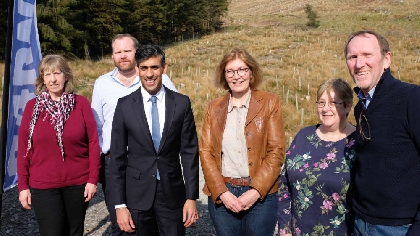
Householders in Cotterdale in the remote centre of the Yorkshire Dales National Park have attained the fastest Internet speeds in England.
Local volunteers dug in around three miles of cabling with the support of non-profit community benefit society B4RN using a Government voucher scheme, as well as the National Park Authority’s Sustainable Development Fund.
They have installed gigabit full fibre broadband to all of the 14 homes in the hamlet, which is situated off the A684 in Upper Wensleydale.
Local MP Rishi Sunak last month attended a ‘switch on’ ceremony to mark the development.
Cotterdale resident Ruth Rennison said: “When the girls lived at home if you wanted to download anything it took hours, whereas now if we want to download something – even a film – it’s finished before you’ve even noticed. Simple things like I do a shopping order every week. That could take me an hour to do before, whereas now it takes seconds. My daughters are up and gone to Leeds, but we actually have faster Internet here in Cotterdale than they do there. It costs £30 a month, which is a lot cheaper than it used to be, too.”
Another resident, David Colley, who served as the project leader for the eight months it took to complete the work, highlighted the importance of the £10,000 grant from the Sustainable Development Fund.
He said: “The SDF grant helped us immensely. It was the first big chunk of money, the first big affirmation that this was a project that people could get behind. After that lots of people in the community fell in and invested a thousand pounds here, fifteen hundred pounds there. So it really was the starting point for the money coming in.”
The project began when Mr Colley heard that Broadband for the Rural North (B4RN) were helping the nearby community in Mallerstang, over Lunds Fell, to install fibre optic broadband to houses. Along with other volunteers, he put together a plan, contacted landowners to seek permission to dig across their land, and raised funds.
The fibre optic cabling network was led along the roadside of the A684 from the Moorcock Inn in Upper Wensleydale, where it had previously ended, to Thwaite Bridge Farm, before being led north over the fell and into Cotterdale.
Mr Colley said: “It’s a game changer for Cotterdale. It gives reliability of service. The service is not affected by weather as the previous BT service was, as all the cables are dug into the ground. And with no mobile signal here, it allows for wifi calling within the hamlet.
“We’ve been here for three years. I’m a Darlington lad myself. The fibre optic broadband allows me to work from home. It allows me to keep in contact with lots of people very quickly. And anyone that visits us is absolutely amazed by the speed of the access to the Internet.”
Landowner Sandra Facer, who farms in Cotterdale, was described by Mr Colley as playing a ‘fundamentally important’ role in the project by giving permission for cables to be dug in across her farmland.
She said: “I gave wayleave with no questions asked. They could go where they wanted. I would be a right bad‘un if I hadn’t, wouldn’t I?”
Richmond (Yorks) MP Rishi Sunak said: "This is a tremendous example of what can be achieved. Cotterdale is one of the most isolated parts of my constituency and yet it now has broadband speed and quality better than many of our cities.
"The volunteers and B4RN have done an excellent job in overcoming geographical isolation and I am delighted that scheme has also been assisted by £47,000 of Government funding - direct to households and businesses - through the Gigabit Broadband Voucher scheme."
The Sustainable Development Fund officer at the Yorkshire Dales National Park Authority, Andrea Burden, said: “We have been ready supporters of communities working with B4RN. Not only does it provide broadband speeds that can support new businesses, home-working and educational access but it does so in a way that has almost no impact on the special landscape of the National Park. Last year we funded a similar community scheme in Mallerstang and this year we’re supporting more projects in Ravenstonedale and Wharton in Cumbria.”
Michael Lee, the CEO of B4RN, said: “What we exist to do is connect the really hard to reach rural properties that other suppliers aren’t interested in connecting. So we work with communities to enable them to connect. We don’t do it for them or to them.
“We work with volunteers and with people who are passionate about getting their communities connected to high speed broadband, because they recognise all the benefits that will bring in terms of connectivity, education and how they run their businesses.
“It’s hard work digging all the fibre in the ground. The only way we can do that is by working with champions in the community. So we are led by two things: community demand and by government policy. We have done this through a government voucher scheme. What that means is that the government makes funding available to connect the hardest to reach properties. Every time we connect a hard to reach property we get a voucher: a small amount of money that we can put towards the build costs.”


 Custodians of the Soil: Beautiful images of nature-friendly farmers
Custodians of the Soil: Beautiful images of nature-friendly farmers
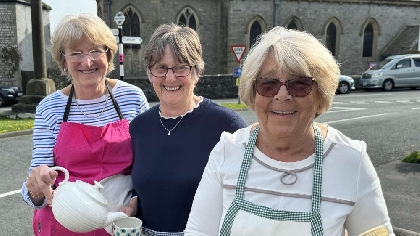 Go Cuckoo in Austwick this Bank Holiday
Go Cuckoo in Austwick this Bank Holiday
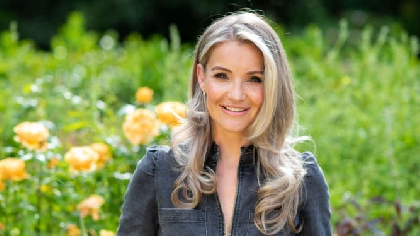 Celebrity guests at this year's Great Yorkshire Show announced
Celebrity guests at this year's Great Yorkshire Show announced
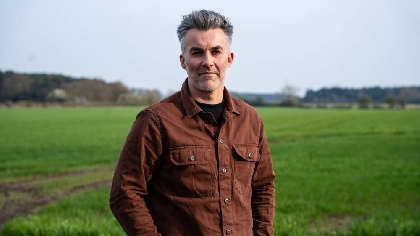 Labour sweeps to victory in mayoral election
Labour sweeps to victory in mayoral election
 Work well underway at Kex Gill
Work well underway at Kex Gill
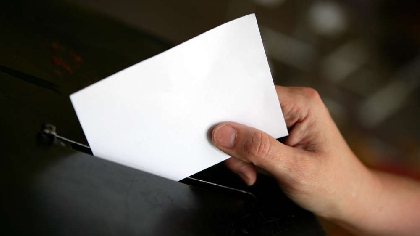 How to vote in Thursday’s mayoral election
How to vote in Thursday’s mayoral election
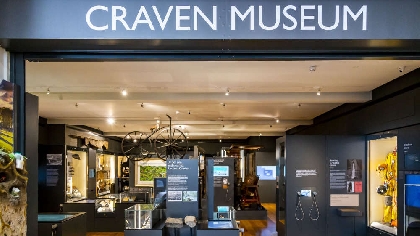 Craven Museum shortlisted for the world’s largest museum prize.
Craven Museum shortlisted for the world’s largest museum prize.
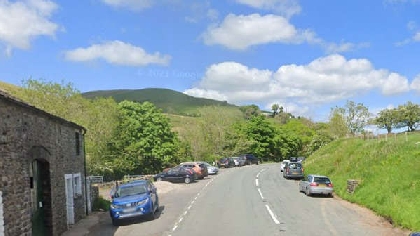 Bridge approved near waterfall despite visitor hotspot concerns
Bridge approved near waterfall despite visitor hotspot concerns
Comments
Add a comment